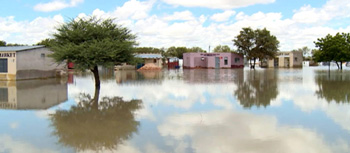
Benefits of conservation for all

Attending the launch of the policy document are Deputy Minister of Environment and Tourism, Pohamba Shifeta with Maxi Louis, Director of the Namibian Association of CBNRM Support Organizations (NACSO). Also pictured are Elias Kharuxab representing the Southern regions, Dave Kangombe representing the North West regions, Marama Kavita representing central regions, Francis Lisao representing the North Eastern regions and Sem Shikongo,Director of Tourism in the Ministry of Environment and Tourism. (Photograph by Hilma Hashange)
The policy was launched this week by Deputy Minister of Environment and Tourism, Pohamba Shifeta and coincided with the launching of the State of Conservancy Report.
The policy provides a framework that promotes the wise and sustainable use of natural resources on state land outside protected areas. Natural resources for community based management include wildlife, tourist attractions, fish, water, forest resources and vegetation for grazing.
The policy forms part of the CBNRM programme which according to Shifeta, has become a major development programme in the country and a conservation tool. “Since 1996, our Conservancy Programme has grown from a small pilot project to one of the country’s major development programmes, sound practices are therefore needed for the sustainable utilization of our natural resources on an economically beneficial basis,” Shifeta said during the launch.
He added that the policy recognizes the rights and development needs of local communities, the need to promote biodiversity conservation and [it] empowers present and future generations to manage and benefit from the natural resources.
According to Shifeta, the CBNRM programme is firmly entrenched in Namibia’s National Development Plans and Poverty Reduction Strategies, adding that conservancies are explicitly included as part of the country’s rural development strategies in the National Development Plans and Vision 2030.There are currently 79 registered conservancies in the country where thousands of rural communities benefit through employment, cash income, social projects and in-kind benefits.
One of the main aims of the CBNRM programme is to enable conservancies to become financially and institutionally sustainable. Shifeta therefore issued a stern warning to conservancies and groups of individuals to refrain from corrupt activities such as the mismanagement of conservancy funds and resources, adding that the ministry will leave no stone unturned and will bring the culprits to order.
Shifeta also urged conservancy members and traditional authorities to commit to nation building and not indulge in infightings and tribal differences. “A conservancy is not a tool to divide the community members along political, tribal, racial or ethnic lines but a vehicle towards rural economic emancipation,” the Deputy Minister said.














































